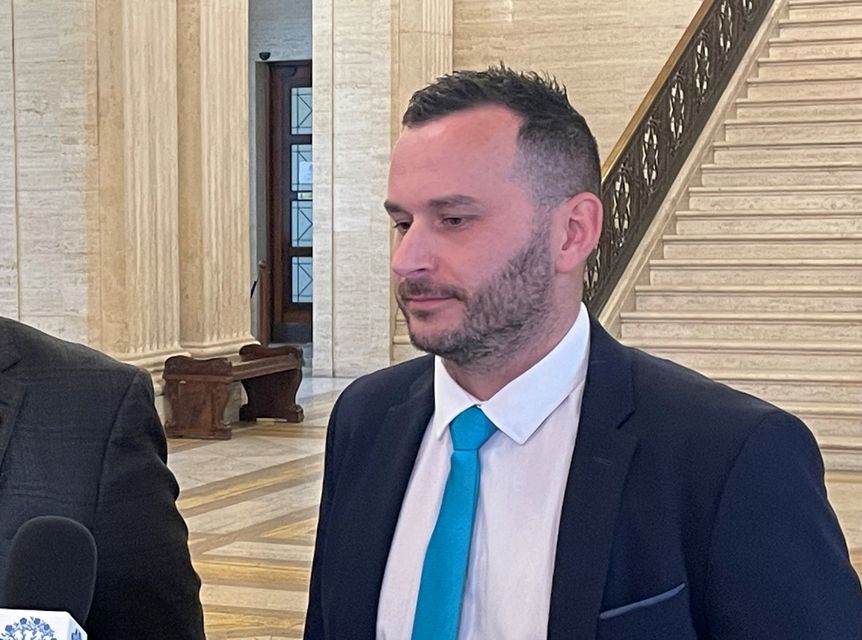MLAs are to seek legal advice on compelling institutions involved in historical abuse cases to give evidence to an Assembly committee.
The move comes after several of the institutions declined invitations to appear before the Executive Office committee.
Committee chairwoman Paula Bradshaw said officials had been involved in “cat and mouse” exchanges in their unsuccessful attempts to get the institutions to come before the committee.
In 2017, the Historical Institutional Abuse Inquiry, led by the late Sir Anthony Hart, revealed the extent of sexual, physical and emotional abuse at homes run by the state, church and charities in Northern Ireland from 1922 to 1995.
TUV MLA Timothy Gaston raised concern at the failure of institutions to attend the Executive Office committee (David Young/PA)
The report recommended six organisations make contributions towards the cost of the redress scheme and specialist support services for victims and survivors.
The De La Salle Order, the Good Shepherd Sisters and Barnardo’s have all made contributions to date. The process of seeking payments from the Sisters of Nazareth, Sisters of St Louis and the Irish Church Missions is ongoing.
At a meeting of the Executive Office committee on Wednesday, TUV member Timothy Gaston raised concerns about the failure of institutions to come to give evidence.
He then referred specifically to the De La Salle Order and Sisters of Nazareth and correspondence they had sent the committee about their non-attendance at the meeting.
Mr Gaston noted that Section 44 of the Northern Ireland Act could be invoked to compel institutions to appear.
“I would like to ensure that this committee takes all appropriate measures to bring them here,” he said.
Ms Bradshaw said committee officials had been “very tenacious” in trying to get the institutions to attend. She said the committee clerk is now working on fulfilling the requirements of invoking the compellability power.
“We had tried to get them here, I think it was June first of all, some of the institutions, and we have been playing this cat and mouse game ever since,” she said.
Asked by Mr Gaston if the committee would take all measures possible to ensure their attendance, Ms Bradshaw replied. “We are, we’re not letting this go.”
She said the hearing on Wednesday was the effective deadline for the institutions to agree to attend voluntarily.
“We invited them all to come today,” she said.
“So it was only then, whenever the lack of communication against that invitation and the refusal etc, it was only then, once this date had passed, then that allows us then to demonstrate that we had done everything up to this point. And we’ll now move into this next section.”
The committee clerk told members they were at the beginning of a lengthy process in regard to compelling the witnesses to attend.
He said the institutions had already been advised of the Section 44 power held by the committee.
The clerk said all communications with the institutions were now being compiled ahead of securing legal advice from the Legal Services department of the Assembly to ensure the committee was on a sound footing to invoke the power.
In regard to committee invites, the clerk said some of the institutions had not even replied.
On Wednesday the committee did hear from Mr Justice Fowler, who is president of the Historical Institutional Abuse Redress Board.
The board began receiving applications in 2020 and will formally close to new claims at the start of April next year.
In 2021, the Commissioner for Survivors of Institutional Childhood Abuse, Fiona Ryan, had voiced concerns that the then rate of processing could see it take 10 years for the board’s redress panels to get through all the anticipated 5,000 claims.
Justice Fowler made clear that prediction would not come to pass.
He said that as of August 31, the board had received in excess of 4,600 compliant applications and had considered around 4,500 of those. The board president said financial awards of more than £93.5 million had been made.
“Currently, at present only 57 applications and one appeal remains to be considered,” he added.
He said while the board had a target of considering applications within 20 weeks, the current timeframe was much shorter, at between seven to seven-and-a-half weeks.
“This compares very favourably against other redress schemes within Ireland and the UK, some of those schemes incur timescales of between 12 months and 22 months,” he said.
“I’m aware that this committee in 2021 previously took testimony from others that it would take somewhere in the region of 10 years for the redress board to consider such applications. This is clearly not the position.”
